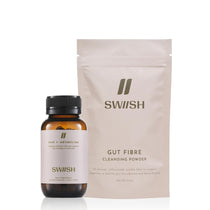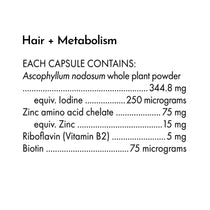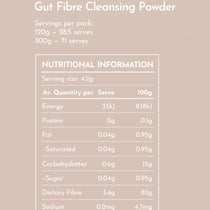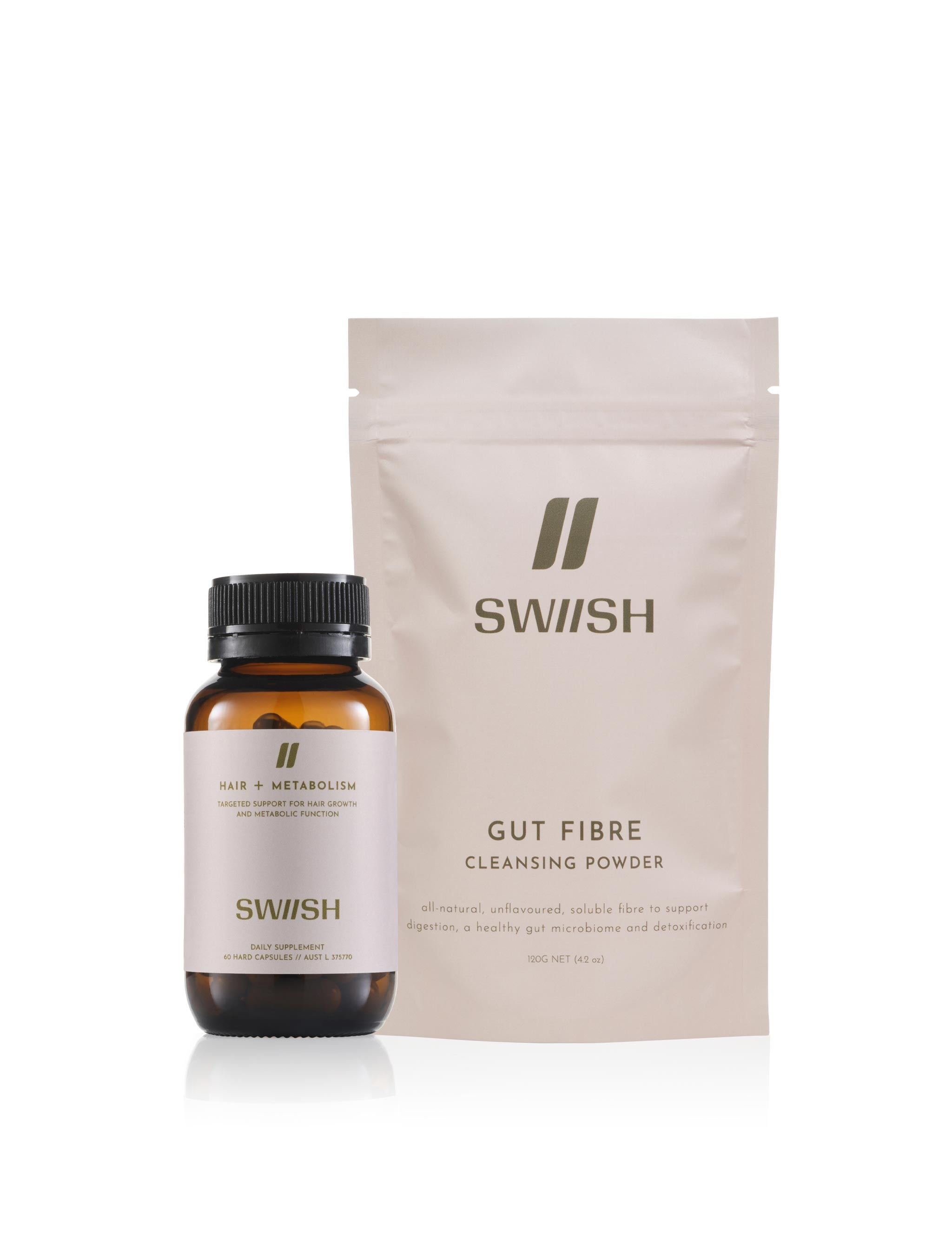
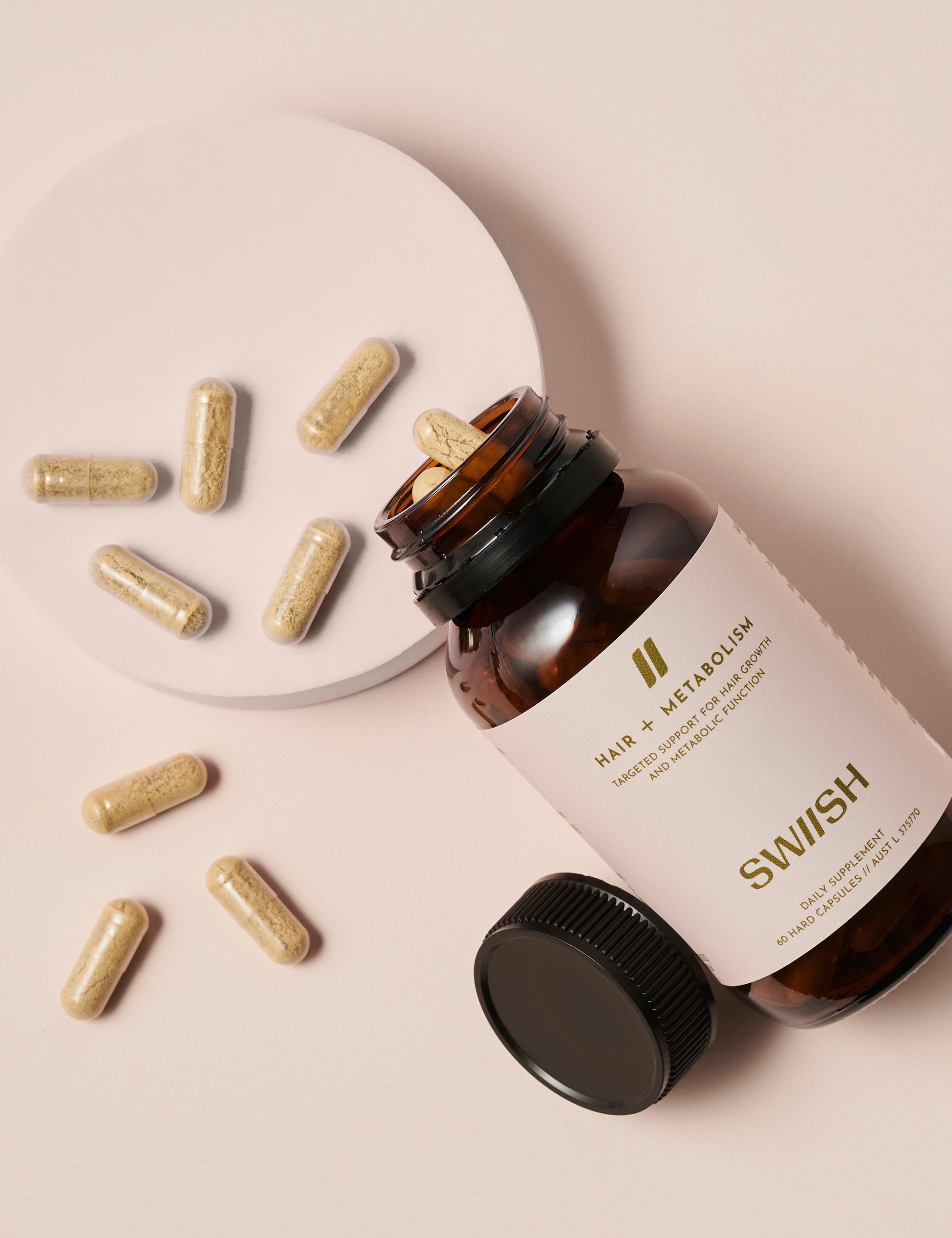
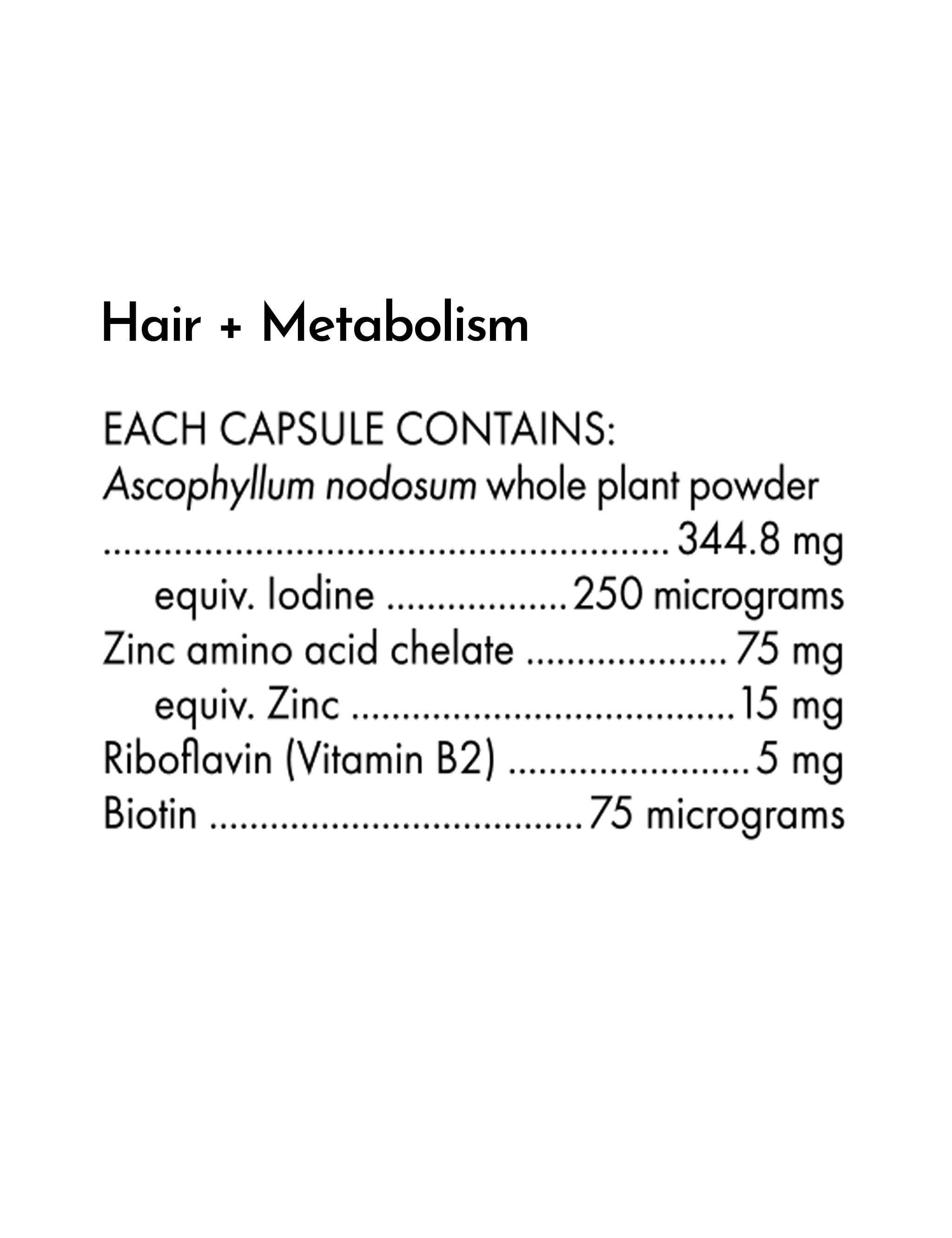

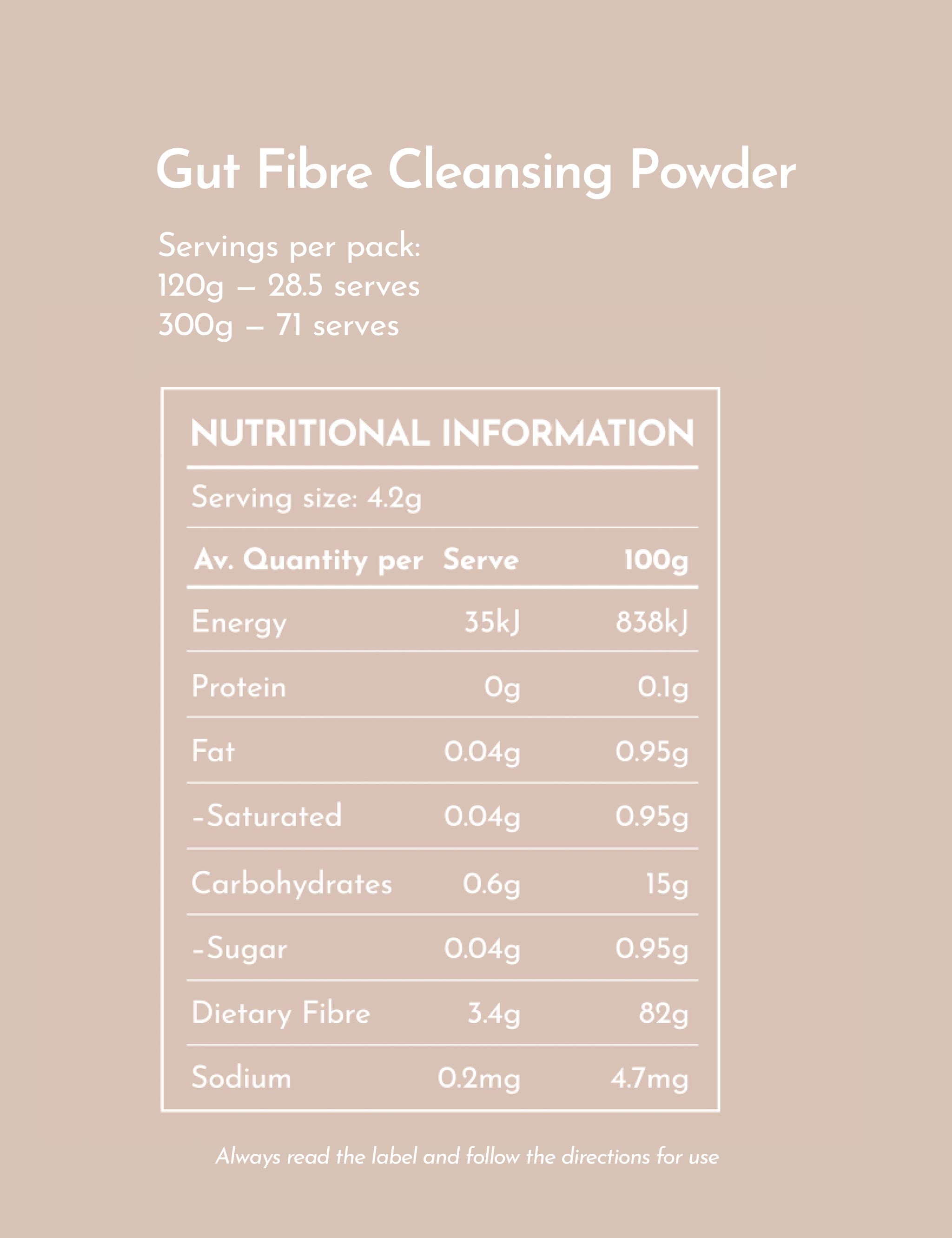


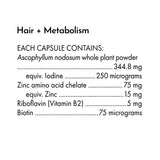

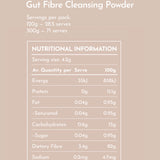
Metabolism Activator
Kickstart a sluggish metabolism.
This is a powerhouse duo - the Hair + Metabolism supports metabolism function and the GUT FIBRE contains a soluble fibre - well researched for its role in weight loss and reduction of belly fat.
Includes: 1 x Hair + Metabolism (60 Capsules), 1 x GUT FIBRE Cleansing Powder (120g)
Got questions? Check our FAQs below or email us at hello@swiish.com.au
Benefits
GUT FIBRE CLEANSING POWDER
— Excellent source of prebiotics
— Supports a strong and diverse gut microbiome
— Feeds good gut bacteria
— Gentle source of fibre that won't irritate your gut
HAIR + METABOLISM
— Supports metabolism
— Skin support
— Hair growth
— Hair health
Directions
Ingredients
GUT FIBRE Cleansing Powder: 100% Maize Dextrin (Non-GMO).
Packed in a facility that processes products containing gluten, wheat, milk, fish, soy, almonds, Brazil nuts, cashews, hazelnuts, macadamias, pecans, pine nuts, pistachios and walnuts.
HAIR + METABOLISM: Ascophyllum nodosum whole plant powder 344.8 mg (contains iodine 250 micrograms); Zinc amino acid chelate 75 mg (equiv. zinc 15 mg); Riboflavin (Vitamin B2) 5 mg; Biotin 75 micrograms. Contains soya bean products and phenylalanine. We advise people with a fish and/or crustacean (shellfish) allergy to consider that the seaweed utilised in this product may have come into contact with fish and/or crustaceans in the sea.
♻︎ All SWIISH packaging can be recycled in your normal household recycling.
FAQs
What we leave out:
Free from gluten, dairy, lactose and nuts.
How do I know if my metabolism isn’t functioning at its peak?
Metabolic rate varies from person to person and can reduce depending on age, underlying medical conditions, extreme dieting, hormones, etc. It is important to consult with your healthcare practitioner to assess your individual metabolic function, however, some signs that your metabolism may be functioning slower than normal are:
— Fatigue & lethargy
— Weight changes
— Hair loss
— Mood changes
— Dry or troubled skin
— Brittle or weak nails
— Cognitive difficulty
— Sugar cravings
How long will it take for my metabolism to improve?
Results will vary from person to person as every individual is different, however, metabolism may improve after 30-60 days with consistent daily supplementation.
Can I have these products while pregnant or breastfeeding?
We don’t recommend Hair + Metabolism during pregnancy or breastfeeding. Our GUT FIBRE Cleansing Powder is safe to consume while pregnant and breastfeeding. However, as everyone’s situation is different, we recommend that you check with your healthcare professional to see if this powder would be beneficial for you.
The Science
GUT FIBRE Cleansing Powder – Supports A Healthy Digestive System
Although there are microbiomes all over the body, the most important for overall health and wellbeing is the gut as this is central to almost every process in the body. Containing trillions of microorganisms with over 1000 known species of bacteria, a healthy gut microbiome is involved in:
— Regulating gut inflammation that can cause or minimise subsequent systemic inflammation
— Neurotransmitter synthesis: bacteria in the gut help produce neurotransmitters such as serotonin, dopamine, and acetylcholine, which regulate mood, cognition, and other important functions
— Hormone synthesis, regulation, and clearance
— Toxin/pathogen neutralisation and elimination
— Digestive and metabolic processes, including energy production
— Immune strength: over 70% of the immune system resides in the gut, within the Gut–Associated Lymphoid Tissue (GALT)
Prebiotics
These compounds in food feed the living microorganism in your gut, encouraging a diverse range of good bacteria that outweighs the bad. It is important to note that there is always a level of “bad” bacteria in your gut, this is normal. It is the balance between these beneficial and potentially harmful bacteria strains that’s important. There are two types of fibre: insoluble and soluble. Both feed your gut bacteria, helping them to thrive and your digestive system to function at its best. Our GUT FIBRE Cleansing Powder is made of 100% pure maize dextrin which is a form of soluble fibre.
HAIR + METABOLISM — Metabolism
Metabolism refers to the process in which your body converts what you consume into energy. Metabolic rate is the speed at which it does this, measured by the amount of energy per unit of time that a person is able to process to keep their body functioning. Metabolism is often thought of as being interchangeable with the word digestion, but it is actually far more complex and widespread than that. Metabolism exists in every cell in the body, as each unique cell requires energy to do its job. Maintaining a good metabolic rate means each cell in the body is able to yield enough energy to carry out its role in the body – whether it’s a cell in skeletal muscle, the lungs, skin, gastrointestinal tract, etc. There are a number of factors that can slow your metabolic rate, they vary from stress and fad dieting to age, muscle mass, hormonal factors and more. Metabolic rate will also vary from person to person. When metabolism is slower, and/or you consume more calories than your body is able to convert to energy and use, the body is designed to store this excess energy in adipose tissue (fat cells). There are a number of nutritional minerals and vitamins that can support metabolism. Biotin is one of them, as it helps convert fats and carbohydrates (macronutrients from food) into energy. Beyond this, biotin is involved in energy–yielding metabolism and subsequent energy production.
(European Food Safety Agency. EFSA Journal. Biotin health-related claims. 2009; 7(9):1209)
Riboflavin is predominantly found as an integral component of coenzymes, flavin adenine dinucleotide (FAD) and flavin mononucleotide (FMN). FAD is an important component of the respiratory chain, closely involved in energy generation. It assists with releasing energy from food and moreover helps convert carbohydrates into adenosine triphosphate (ATP) — the carrier of energy within cells. As a B Vitamin, riboflavin is also involved in other metabolic energy–producing processes, including the citric acid cycle, as well as contributing to iron transportation and metabolism within the body.
(GlobinMed Monographs. Global Information Hub on Integrated Medicine. 2015)
(Gregory, P J, et al; Natural Medicines, Therapeutic Research Center, 2015)
Iodine is a trace element that supports thyroid function and energy production. The main function of iodine is to synthesise thyroid hormones triiodothyronine (T3) and thyroxine (T4). Thyroid hormones are involved in stimulating basal metabolic rate, as well as the production of body heat. Beyond this, thyroid hormones are also involved in cellular oxygen consumption/use used to produce ATP (which in turn supports metabolic rate).
(Braun L and Cohen M Herbs and Natural Supplements An Evidence-Based Guide, Vol 2. 4th ed. Elsevier. 2015. pp. 575-83)
(GlobinMed Monographs. Global Information Hub on Integrated Medicine. 2011)
- RenataVerified BuyerReviewingHair + MetabolismI recommend this productRated 5 out of 5 starsSo Effective Even My Husband “Complained”!
I bought this product for myself first. After four weeks, I started noticing changes in hair growth, and my hair and nails became much stronger. Since getting a short hairstyle for the first time, I’ve been able to maintain it without needing much product because my hair feels thick and strong. My nails are also noticeably stronger.
I then started giving the tablets to my husband, and he was “complaining” about how fast his hair and nails are growing! He mentioned how strong they feel now—no wonder why! 😂
We are both so happy with this product. Thank you, Sally and Maha!
Was this helpful? - Teresa P.Verified BuyerReviewingGut Fibre Cleansing PowderI recommend this productRated 5 out of 5 starsGut Fibre Cleansing Powder
I have been feeling more regular in my bowel since taking this product and it's only been a couple of weeks.
Was this helpful? - Nathalia M.Verified BuyerReviewingGut Fibre Cleansing PowderI recommend this productRated 5 out of 5 starsThe best in the market!
I’ve tried different fibre products but nothing compares to Swiish one. It’s so easy to incorporate with any drink (or simply water) as it doesn’t have any taste and the powder is really fine.
It has also definitely help my gut problems! I travel for work a lot and can’t think of not having this every day so had to buy the sachets to take with me
Was this helpful? - VeronicaReviewingHair + MetabolismI recommend this productRated 5 out of 5 stars5 Stars
Long time user of this product. The results just keep delivering!
Was this helpful? - Sue A.Verified BuyerReviewingHair + MetabolismI recommend this productRated 5 out of 5 starsFantastic product
I won’t ever go without this supplement from Swiish ever again. It has made such a difference to how much more hair I have gained back since starting it!!
Was this helpful?
- Related products

